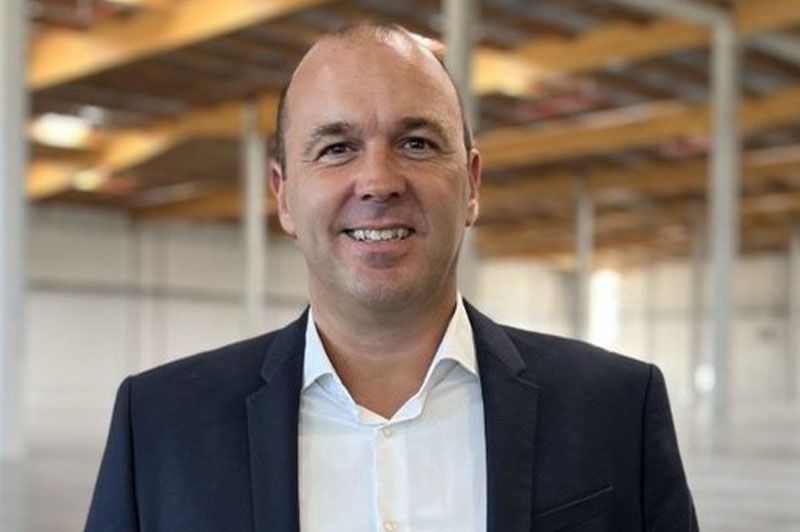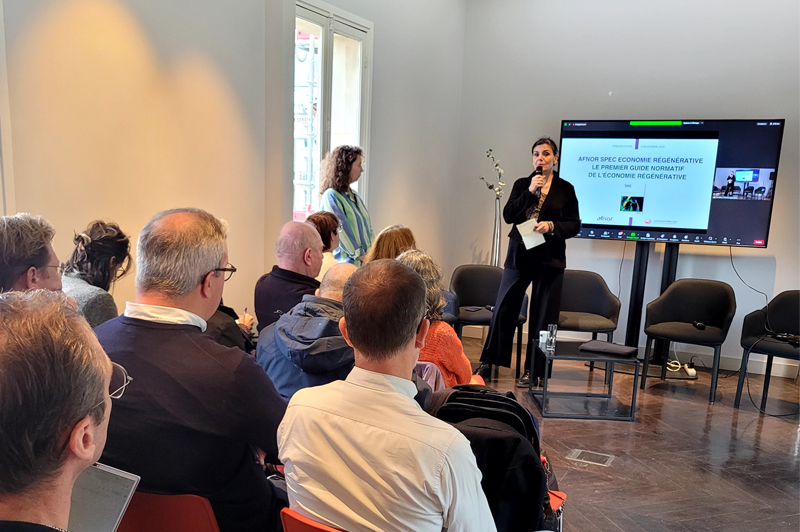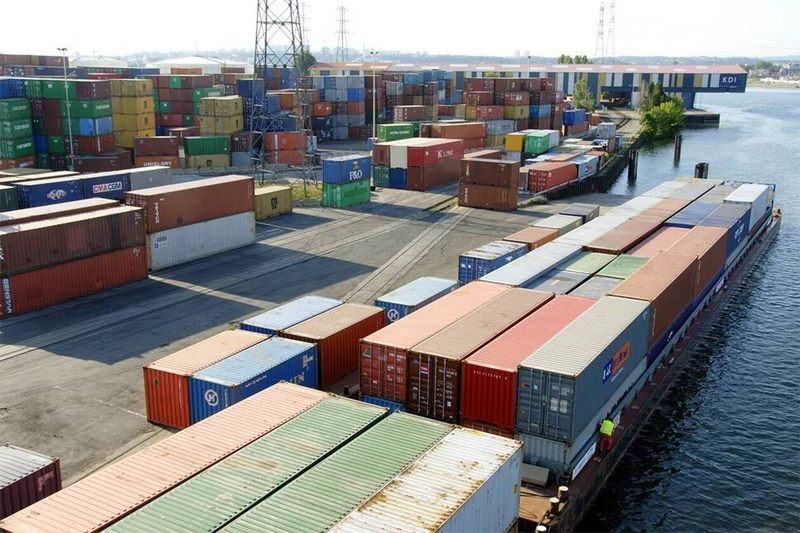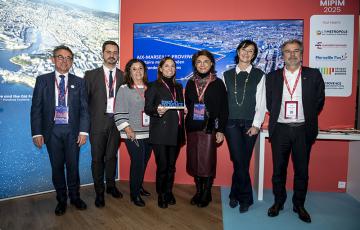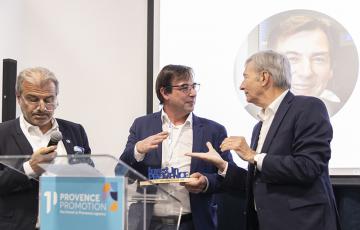European journalists discover Aix-Marseille-Provence’s renowned innovation ecosystem
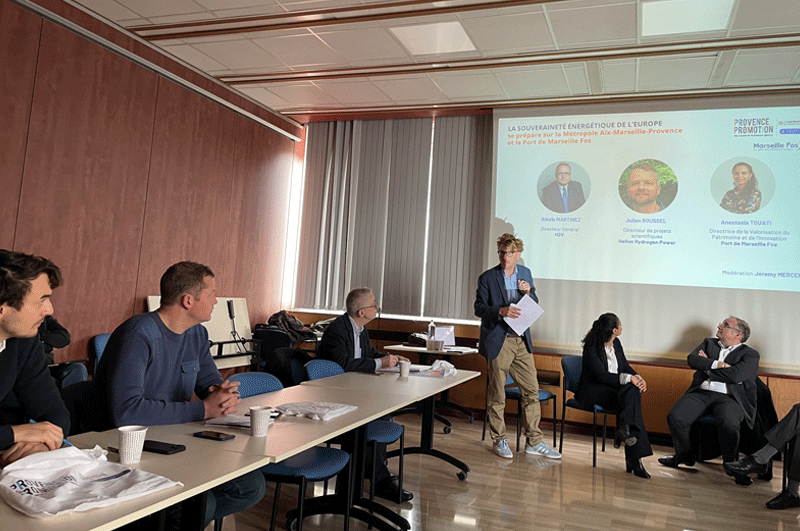
Provence Promotion organized a media tour as part of the iCapital ceremony for the next European Capital of Innovation
After serving as the European Capital of Innovation last year, the Aix-Marseille-Provence Metropolis passed the torch to Lisbon at the iCapital Awards ceremony held in Marseille on November 27. To mark the occasion, Provence Promotion invited journalists from the European business press to discover the territory’s innovative industrial and strategic projects focused on decarbonization, energies of the future, and sustainable, connected cities. The Aix-Marseille-Provence Metropolis is dedicated to ensuring European energy sovereignty and offers broad support for the development of innovative European companies in its territory. This commitment was illustrated during two roundtable discussions, one at the Port of Marseille Fos and one at thecamp innovation campus, as well as by a visit to the ITER site. The two-day media tour enabled journalists to meet some of the territory’s leading innovation players.
 On November 27 and 28, Provence Promotion organized a media tour of the pioneering innovation sites in Provence. The tour was held to mark the end of Aix-Marseille-Provence’s one-year term as the European Capital of Innovation and to celebrate the announcement of Europe’s new innovation capital. The iCapital Awards 2023 were held at the Mucem museum in Marseille on November 27, which was the first time the ceremony was held outside of Brussels.
On November 27 and 28, Provence Promotion organized a media tour of the pioneering innovation sites in Provence. The tour was held to mark the end of Aix-Marseille-Provence’s one-year term as the European Capital of Innovation and to celebrate the announcement of Europe’s new innovation capital. The iCapital Awards 2023 were held at the Mucem museum in Marseille on November 27, which was the first time the ceremony was held outside of Brussels.
Martine Vassal (President of the Aix-Marseille-Provence Metropolis) and Iliana Ivanova (European Commissioner for Innovation, Research, Culture, Education, and Youth) welcomed the six finalist cities at a ceremony held at the Mucem. The winner of the 2023 European Capital of Innovation prize was Lisbon.
The ceremony was the perfect opportunity to invite journalists from top European news outlets on a three-stop innovation tour to see why Aix-Marseille was the winner of the previous iCapital Awards and how the metro area is now establishing itself as a global innovation hub for the 21st century.
Discovering the innovation ecosystem in Aix-Marseille-Provence
After arriving in Marseille, the journalists first attended a roundtable entitled “Europe’s energy sovereignty is being prepared in the Aix-Marseille-Provence metro area” that was held at the Port of Marseille Fos headquarters. The roundtable featured Anastasia Touati, the Director of Patrimony and Innovation for the Port of Marseille Fos, Alexis Martinez, the CEO of H2V, and Julien Roussel, the Chief Scientific Officer at Helion Hydrogen Power.
The Port of Marseille Fos presented its roadmap for sustainable development and highlighted the 1000-hectare site dedicated to the establishment of innovative activities to decarbonize industry. The port is also transforming its infrastructure to build a European hub for hydrogen and low-carbon energies. To reach these targets, an investment of €11 billion over ten years has already been announced.
 Among the projects that are driving innovation at the port is a production facility being developed by H2V at Fos-sur-Mer to mass-produce green hydrogen (600 MW) using water electrolysis. The project takes advantage of the favorable port ecosystem that has renewable energy sources, transportation networks, and storage capacities close at hand. The port will also be a terminal for the BarMar hydrogen pipeline, which will carry hydrogen between Barcelona and Marseille and be a major part of Europe’s first large-scale green hydrogen corridor. The BarMar project has just been put on a list of key cross-border infrastructure projects by the European Commission, which will accelerate permits and grants for the pipeline.
Among the projects that are driving innovation at the port is a production facility being developed by H2V at Fos-sur-Mer to mass-produce green hydrogen (600 MW) using water electrolysis. The project takes advantage of the favorable port ecosystem that has renewable energy sources, transportation networks, and storage capacities close at hand. The port will also be a terminal for the BarMar hydrogen pipeline, which will carry hydrogen between Barcelona and Marseille and be a major part of Europe’s first large-scale green hydrogen corridor. The BarMar project has just been put on a list of key cross-border infrastructure projects by the European Commission, which will accelerate permits and grants for the pipeline.
The Aix-en-Provence-based start-up Helion Hydrogen Power, which was acquired by Alstom to bolster its green energy strategy, then addressed the subject of transportation and mobility. The company is producing cutting-edge hydrogen fuel cells that are a solution for decarbonizing rail and marine transport as they can replace diesel engines. The use of hydrogen also offers the possibility of providing dockside electricity for ships using stationary batteries, thus eliminating CO2 and pollution. Helion Hydrogen Power is France’s oldest manufacturer of hydrogen cells and is now preparing to launch its 6th generation of high-powered fuel cells.
These projects were two concrete examples of local production initiatives that are strengthening Europe’s energy independence.
Romain Wino, the director of the CSR department at Marseille Provence Airport, rounded off the presentation by outlining the airport’s decarbonization strategy. These plans include reducing emissions associated with airport services, adopting energy self-sufficiency with photovoltaic and geothermal energy, and moving ahead with new SAF (Sustainable Aviation Fuel) projects to ensure there are future production outlets in the Aix-Marseille area, notably in conjunction with the Hynovera project in Gardanne near the airport. The objective of the Marseille Provence Airport is to achieve carbon neutrality by 2030.
 ITER, a visit to the heart of the nuclear fusion facilities
ITER, a visit to the heart of the nuclear fusion facilities
The ITER tour was a highlight for the visiting journalists, who discovered the gigantic scale of this experimental nuclear fusion facility. ITER is the world’s largest collaborative scientific project, as it brings together 35 countries and a budget of more than €20 billion to develop clean fusion energy for the future.
ITER is essential for proving the viability of nuclear fusion production on an industrial scale. The site extends across a 42-hectare platform at Saint-Paul-lez-Durance, about 30 minutes north of Aix-en-Provence. It is located beside CEA Cadarache, which is Europe’s largest technological research and development center for energy and focuses on both nuclear and renewable low-carbon energies. The CEA Caderache also supports internationally renowned projects and hosts companies at the Cité des Energies to accelerate the technology transfer process.
thecamp in Aix-en-Provence, a flagship site for managerial and technological innovation
 Following the session at ITER, the visiting journalists concluded their tour with a stop at thecamp. They took part in a roundtable discussion where three European companies that have chosen Aix-Marseille for their innovation projects shared their experiences: Euranova (Belgium), Multiwave Imaging (Switzerland), and Stil Marposs (Italy).
Following the session at ITER, the visiting journalists concluded their tour with a stop at thecamp. They took part in a roundtable discussion where three European companies that have chosen Aix-Marseille for their innovation projects shared their experiences: Euranova (Belgium), Multiwave Imaging (Switzerland), and Stil Marposs (Italy).
Thanks to the possibilities for innovative partnerships in Provence and the French government’s generous research tax credit (CIR), Multiwave Imaging, a subsidiary of Multiwave Technologies SA that develops portable MRI equipment using AI and metamaterial, and Euranova, a data science specialist, both set up R&D centers in Marseille. The companies have been recruiting local PhD students to develop their expertise.
Stil Marposs, an Italian company based in Aix-en-Provence, is further proof that the territory is an ideal location for the development of innovative projects. As a specialist in precision instrumentation for the measurement and control of production processes, the company plans to build a vertical factory in Provence, which is an innovative new industrial model.
The education ecosystem in Aix-Marseille is also essential to encouraging innovation. Alexandre de Navailles, the Managing Director of Kedge Business School, demonstrated this by presenting the Business Nursery incubation program designed to support the school’s students and graduates.
 The final part of the media tour was a meeting with Kevin Polizzi, the iconic telecommunications, cloud, and tech entrepreneur who acquired thecamp in 2022 to support disruptive innovation within companies. His #nextgeneration project aims to accelerate digital, environmental, and managerial transformations with a training program, workshops, and experience feedback to foster positive innovation. A 120-square-meter on-site fab lab offers companies a space to design and draw inspiration from new technologies in the fields of sustainable construction, the energy transition, 5G, and Industry 4.0. Kevin Polizzi plans to reproduce this model by creating a thecamp network in France.
The final part of the media tour was a meeting with Kevin Polizzi, the iconic telecommunications, cloud, and tech entrepreneur who acquired thecamp in 2022 to support disruptive innovation within companies. His #nextgeneration project aims to accelerate digital, environmental, and managerial transformations with a training program, workshops, and experience feedback to foster positive innovation. A 120-square-meter on-site fab lab offers companies a space to design and draw inspiration from new technologies in the fields of sustainable construction, the energy transition, 5G, and Industry 4.0. Kevin Polizzi plans to reproduce this model by creating a thecamp network in France.



 +33 4 96 11 60 00
+33 4 96 11 60 00





